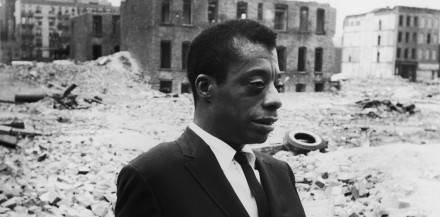The literary and political legacy of James Baldwin is going through a revival through works like Raoul Peck’s Academy Award-nominated documentary, I Am Not Your Negro, and director Barry Jenkins’ film adaptation of If Beale Street Could Talk.
Add to this, the newest issue of The Common Reader: A Journal of the Essay, published by Washington University in St. Louis, and its eleven essays that further explore the lasting work and meaning of the author.
High points of the issue, titled James Baldwin & American Democracy, include Cecil Brown’s piece, “With James Baldwin at the Welcome Table,’’ in which Brown recalls his days as a young novelist hanging out with “Jimmy’’ in Paris and at his St. Paul de Vence home in the south of France.
According to his biographer, David Leeming, Baldwin, then under attack from more militant—and heterosexual—activists and writers like Eldridge Cleaver and Ishmael Reed, was “so used to the crisis of the younger black writers that during his first meeting with Brown he said, ‘I thought you would hate me.’”
But the younger writer paints a portrait of a generous host, welcoming everyone from Miles Davis, Nina Simone, James Jones, and William Styron to the local mailman and village doctor, who became a drinking buddy, as he forged a writing life away from the parallel pressures of American racism and the pressures of being a representative of “black identity.’’
Gerald Early’s essay, “Talkin’ ‘Bout My Generation: James Baldwin, Bessie Smith and the Power of the Essay,’’ recalls the shock of recognition he felt growing up in Philadelphia when he first read Nobody Knows My Name and found a kindred spirit separate from other works of art being held up as iconic. (He later wrote an essay called “The Color Purple as Everybody’s Protest Art’’ that paid homage to Baldwin’s critique of Richard Wright.)
He compares Baldwin’s belated appreciation of Bessie Smith to LeRoi Jones’ play Dutchman, in which a black middle-class character trying to seduce a white woman on the subway offers a final speech: “[Whites] say, ‘I love Bessie Smith.’ And don’t even understand that Bessie Smith is saying, ‘Kiss my ass, kiss my black unruly ass.’”
And he locates Baldwin’s vision, and importance, outside contemporary standards of wokeness, category, or sexual preference: “There was always this sense of doubt about one’s racial identity in Baldwin, a sense that, after all, one can be, in spite of it all, a stranger to one’s own people, hopelessly so, or that maybe one might want to be a stranger to one’s own people.’’
Some of the other essays here are less successful, lapsing into an academic speak to which Baldwin would probably lift an amused eyebrow, but circling back to the complex love-hate relationship the author had to the American experiment.
William J. Maxwell’s “Teaching Baldwin Teaching: Three Class Notes’’ recounts his experience dealing with his “most influential student’’—a young woman who had spent the previous months on the front lines of the Ferguson protests—who vocally applied today’s standards of acceptable writing about gay identity to works like Giovanni’s Room, which she saw as internalized homophobia—“and I thought, under my breath, that she was not entirely wrong about that.”
Maxwell, a professor of English and African-American History at Washington University, takes in the critique, and recognizes that “there may be nothing more poignantly and gallingly estranging than a dearly departed exemplar who on second glance almost—but not quite—flatters the mood of the present.” Life is complex. Or in Baldwin’s words: “just as American history is longer, larger, more various, more beautiful, and more terrible than anything anyone has ever said about it, so is the world.’’
Reading the various essays (and it is good to have them, even if many lack the first-hand verisimilitude of Brown and Early’s work) I’m reminded of an exchange between Dexter Gordon and Baldwin that Maxine Gordon, the widow of the great tenor saxophonist (and author of Sophisticated Giant: The Life and Legend of Dexter Gordon) related at a recent Monterey Jazz Festival panel moderated by Angela Davis.
“They ran into each other at a party,’’ she said, “and Jimmy called out, ‘Hey Dexter, I keep reading that we’re expatriates. I thought we were just living in Europe.’’’
You can’t go home again, but you can’t leave it, either.

